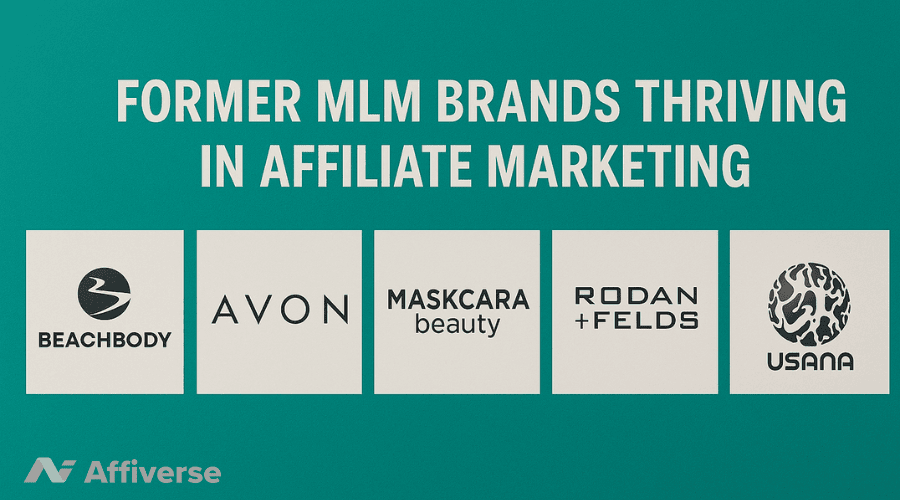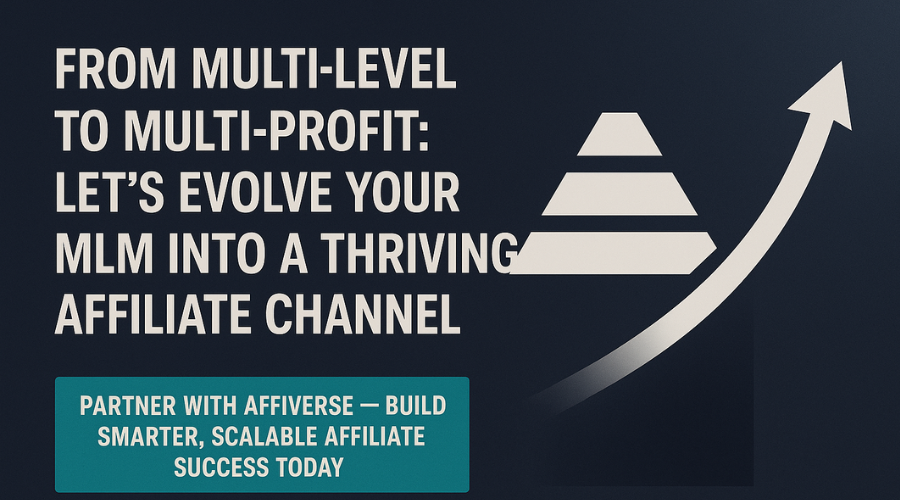Success Stories: Former MLM Brands Thriving in Affiliate Marketing

As regulatory pressures and changing consumer preferences reshape the direct selling landscape, a growing number of multi-level marketing (MLM) companies have pivoted to affiliate marketing models. This transition is proving successful for several major brands that have embraced more transparent, streamlined approaches to product promotion.
BODi (Formerly Beachbody): From Team Building to Content Creation
Perhaps the most notable success story in the MLM-to-affiliate transition is BODi, formerly known as Beachbody. The fitness and nutrition company announced its shift away from multi-level marketing in October 2024, officially shutting down its old partner network on January 1, 2025.
BODi now offers one of the most generous commission structures in the affiliate marketing space, with rates up to 50% on sales. This represents one of the highest commission rates in the fitness industry, making it particularly attractive to health and fitness content creators.
According to the company’s executive chairman Carl Daikeler, the previous MLM approach was “outdated and unsustainable.” In his announcement, Daikeler stated: “The evolution to the affiliate model offers a simpler, more modern approach to customer acquisition and will directly reward the seller for their effort. The organizational challenges and complexity of the MLM approach has weighed on the company’s turnaround and the ability of partners to optimize their potential.” (Source: amvsmlm.com)
The BODi affiliate program is hosted on the Impact affiliate network, where fitness influencers and content creators can promote the company’s workout programs and supplements without the previous requirements of maintaining personal volume or focusing on recruiting other coaches.
Seint (Formerly Maskcara Beauty): Higher Commissions, Fewer Requirements
Seint, previously operating as Maskcara Beauty, has also successfully transitioned from its MLM “artist” program to an affiliate model with commissions ranging from 25% to 45% on sales. This beauty company specializes in innovative makeup products and has found particular success with beauty influencers and content creators.
The new structure allows promoters to showcase Seint’s makeup products through tutorials and reviews while earning substantial commissions. According to Seint’s affiliate commission guide, affiliates can earn between 25-45% on each sale they generate, depending on their affiliate level.
While Seint has retained some elements of its previous business model, including a $50 enrollment fee and $35 annual maintenance fee, it has eliminated the multi-level component. This focus on product quality and authentic promotion rather than recruitment has improved both brand perception and promoter satisfaction.
Rodan + Fields: Premium Skincare’s New Approach
Skincare company Rodan + Fields made its transition to an affiliate marketing model in September 2024. The company, founded by dermatologists Dr. Katie Rodan and Dr. Kathy Fields, evolved from its complex consultant-based MLM structure to a more streamlined approach.
In a blog post on their website, the company explained that the shift would “help us reach a broader audience, allowing brand lovers to shop from our website or purchase from our Brand Consultants.”
The new model offers a 30% commission rate on sales, allowing former consultants to focus entirely on product recommendations rather than team building. However, the Rodan + Fields affiliate program is currently only available to existing brand consultants who were part of the company before the transition.
Avon: A Legacy Brand’s Digital Transformation
Following its acquisition by Natura & Co., Avon transformed its century-old MLM structure into a more streamlined affiliate model. This represents one of the most significant transitions in the industry, given Avon’s historical prominence in direct selling.
Avon’s affiliate program, available through the AWIN affiliate network, offers 10% commission on sales. While this rate is lower than some others in the beauty space, the elimination of inventory requirements, simplified qualification criteria, and reduced pressure to recruit have made this a welcome change for many representatives seeking a more sustainable business model.
Affiliates can now promote Avon products without the overhead costs and recruitment pressure of the previous MLM model. The company’s commission structure simplifies what was once a complex, multi-tiered compensation plan.
USANA: Testing the Waters
Health and wellness company USANA launched its affiliate program on January 17, 2025, offering commissions ranging from 15% to 20% of sales, paid out weekly. According to reports from former associates, affiliates do not need to become associates or purchase products to qualify for the program.
USANA affiliates receive their own dashboard where they can send customers to purchase products. They are also given considerable freedom to market the products, including through their own websites, and are even allowed to use the term USANA in their affiliate name. (Source: Wealthy Affiliate)
This hybrid approach—maintaining the traditional MLM structure while adding an affiliate program—represents a cautious step toward more modern marketing methods. It remains to be seen whether USANA will eventually transition completely to an affiliate model.
Why These Transitions Are Succeeding
The success of these transitions highlights several advantages that affiliate marketing offers over traditional MLM structures:
- Simplified Compensation: Affiliate marketing removes the complex, multi-tiered compensation plans that can confuse both promoters and customers. The straightforward commission structure—typically a percentage of each sale—is easier to understand and more transparent.
- Lower Barriers to Entry: Most affiliate programs are free to join, eliminating the often substantial startup costs associated with MLM enrollment. This makes them more accessible to a wider range of promoters.
- No Inventory Requirements: Unlike MLM distributors, who often need to purchase and maintain inventory, affiliates never need to buy, store, or ship products.
- Focus on Authentic Promotion: Without recruitment pressure, affiliates can focus entirely on genuine product recommendations, which resonates better with today’s skeptical consumers.
- Enhanced Regulatory Compliance: The simpler business model helps companies avoid the regulatory scrutiny that often surrounds MLM practices, particularly regarding income claims and recruitment practices.
The Future of Direct Selling
These success stories suggest that the future of direct selling may increasingly lean toward affiliate marketing models. As more MLM companies make the transition, best practices are emerging that help both companies and their promoters succeed in this new landscape.
For consumers, these changes mean more transparent marketing practices and less pressure from friends and family to join business opportunities. For companies, affiliate marketing offers a more sustainable business model with lower regulatory risk and better alignment with modern digital marketing practices.
For those in the direct selling industry, these success stories demonstrate that it’s possible to maintain the personal touch and product advocacy that have long been hallmarks of direct selling, while moving away from the often controversial recruitment and multi-level compensation elements of traditional MLM.







